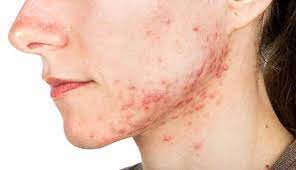Acne is a common skin condition that occurs when hair follicles become clogged with oil, dead skin cells, and bacteria. It can appear as blackheads, whiteheads, pimples, or cysts, and is most commonly found on the face, chest, back, and shoulders. The diagnosis and treatment of acne can vary depending on its severity. Here’s an overview of the process:
- Diagnosis:
- Visual examination: A dermatologist will examine your skin to determine the type and severity of acne. Take isotroin 20 or isotroin 10 for acne.
- Medical history: They will ask about your symptoms, previous acne treatments, and any factors that may contribute to your acne, such as hormonal imbalances or medication use.
- Treatment options:
- Over-the-counter (OTC) products: Mild acne can often be managed with OTC treatments containing ingredients like benzoyl peroxide, salicylic acid, or sulfur. These products help to unclog pores, reduce inflammation, and kill bacteria.
- Prescription medications: For moderate to severe acne, a dermatologist may prescribe topical or oral medications. These may include retinoids (e.g., tretinoin), antibiotics (e.g., clindamycin), hormonal therapies (e.g., oral contraceptives or spironolactone), or isotretinoin (for severe cases).
- Procedures: In some cases, dermatologists may recommend procedures to treat acne, such as chemical peels, microdermabrasion, or light therapy (e.g., photodynamic therapy or laser therapy). These procedures can help to reduce inflammation, kill bacteria, and improve the appearance of the skin.
- Lifestyle changes: Dermatologists often suggest certain lifestyle modifications to complement medical treatments. These may include gentle cleansing of the skin, avoiding harsh or oil-based products, using non-comedogenic cosmetics, practicing good hygiene, avoiding picking or squeezing pimples, and maintaining a healthy diet.
It’s important to note that the treatment plan may vary for each individual, and a dermatologist will tailor the approach based on your specific needs and the severity of your acne. It’s recommended to consult with a healthcare professional to receive an accurate diagnosis and appropriate treatment options for your acne.
Home remedies for acne
While it’s always best to consult with a dermatologist for a proper diagnosis and treatment plan, there are some home remedies that may help manage mild cases of acne. Here are a few options you can consider:
- Keep your face clean: Gently wash your face twice a day using a mild cleanser and lukewarm water. Avoid scrubbing too vigorously, as it can irritate the skin and worsen acne.
- Tea tree oil: This essential oil has natural antibacterial properties and can help reduce acne. Dilute tea tree oil with a carrier oil (such as jojoba oil) and apply it to the affected areas using a cotton swab. Leave it on for a few hours or overnight before rinsing it off.
- Honey and cinnamon mask: Mix together a tablespoon of honey and a teaspoon of cinnamon to create a paste. Apply the mixture to your face as a mask and leave it on for 10-15 minutes before rinsing it off. Honey has antimicrobial properties, while cinnamon can help reduce inflammation.
- Aloe vera: Apply fresh aloe vera gel directly to the acne-affected areas. Aloe vera has soothing and anti-inflammatory properties that can help calm the skin and reduce redness.
- Ice: Wrap an ice cube in a clean cloth and apply it to the affected area for a few minutes. This can help reduce inflammation and swelling associated with acne.
- Apple cider vinegar: Mix one part apple cider vinegar with three parts water and apply it to your skin using a cotton ball. Leave it on for about 10 minutes before rinsing it off. Apple cider vinegar has antimicrobial properties and can help balance the skin’s pH levels.
Remember, these home remedies may provide some relief for mild acne, but they may not work for everyone, and their effectiveness can vary. If your acne is persistent or severe, it’s best to consult with a dermatologist for a proper evaluation and personalized treatment plan.
You may also like
-
Effortless Pigmentation Mark Removal: Exploring the Benefits of Yellow Laser Treatment
-
Pelvic Mesh Implants: What You Should Know About Potential Side Effects
-
How to Recover From a Foot Injury
-
Finding Balance: 7 Stores Offering the Best Traditional Chinese Medicine for Stress Relief
-
Sildisoft 100 and Valentine’s: Crafting Moments of Love

